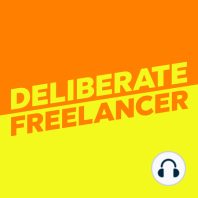27 min listen

#124: How to Create Better Habits (and my Word of the Year)
#124: How to Create Better Habits (and my Word of the Year)
ratings:
Length:
40 minutes
Released:
Jan 13, 2022
Format:
Podcast episode
Description
On today’s show, I talk about my word (phrase) of the year and what I’m hoping to do in 2022. Then, I talk about the importance of habit formation and give several strategies to build better habits. As I begin to work on developing better habits this year, I want to point out that if you try to introduce too much change into your daily life, you’re setting yourself up for failure. Humans are not great at reorganizing their entire day all at once. We have to start small (so don’t make 10 New Year’s resolutions and expect success). You know those people who talk about willpower? Well, willpower is a crock. Willpower does not often get you to where you want to go. It’s habit formation that gets you to your goals, and willpower only causes most of us to feel like failures. Gretchen Rubin, author of “The Happiness Project” and co-host of the Happier podcast, developed a concept and wrote a book about it a few years ago called “The Four Tendencies.” This framework is based on how a person meets inner and outer expectations. The four types are Upholders, Questioners, Obligers and Rebels. (Take the free quiz to learn what type you are.) I’m a questioner, which means I have questions and need justifications before I’ll commit to doing something. It also means outer accountability doesn’t matter to me. It’s why I don’t care about joining a mastermind group or having an accountability partner. And I won’t stick with a class just because I paid for. But that type of accountability works well for obligers, who need accountability to meet inner and outer expectations. These are the people who, when they pay for that yoga class or tell a friend they’ll exercise with them, it works. They do not want to let anyone down so they will show up. You can see how knowing your tendency will help figure out what you need as you start to create habits and try to commit to better habits or new goals. In his book “Atomic Habits,” James Clear talks about making tiny, tiny habits, just a 1% change each day. So, want to start running? On that first day, just run around the block and come home. Don’t push yourself. Don’t go farther. It’ll take 2 minutes. That may sound ridiculous, but you need to focus on the process, routine and the change in your routine. Don’t focus on the running; focus on the habit creation. Starting is the hardest part. Katy Milkman is an economist who studies change behavior at the Wharton School. She was on Dan Harris’ podcast Ten Percent Happier about how to change your habits. Katy talks about this problem of getting started. It’s not about willpower. It’s about the struggle to get started. And that requires habit formation. Katy also talks about something called the “fresh start” effect—that time when we start a new job, or move to a new city, or when the school year starts in September when it feels like a fresh start. That’s the perfect time to implement new habits. January and the new year also feels like a “fresh start” to people and can be a perfect time to start new habits. We just have to be careful not to try to start too many at one time. Gretchen Rubin would say before you start thinking about techniques to use to develop new habits you need to know yourself. That’s why I recommend taking her Four Tendencies quiz. But, in addition, think about the kind of person you are. Are you a night owl? Then, you’re never going to get up at 5 a.m. to exercise! Accept it and aim for a better habit that works for you. A few habit formation strategies to try: Pairing Pair the new habit with something you’re already doing, preferably something you like. For me, that is walking while listening to podcasts—what I like to call Bod and Pod. Accountability As I mentioned earlier, it doesn’t work for everyone, but if works for you, try to build more accountability into your daily life. Maybe find an accountability partner who is also a freelance business owner. Scheduling it Sounds obvious, but sometimes we just f
Released:
Jan 13, 2022
Format:
Podcast episode
Titles in the series (100)
#2: Discover Your Unique Brilliance: You are uniquely brilliant. It’s time to laser in on that brilliance and make THAT the focus of your business. When my workshop coach drew a simple quadrant on a piece of paper, I changed a huge part of my business and began outsourcing parts of my... by Deliberate Freelancer